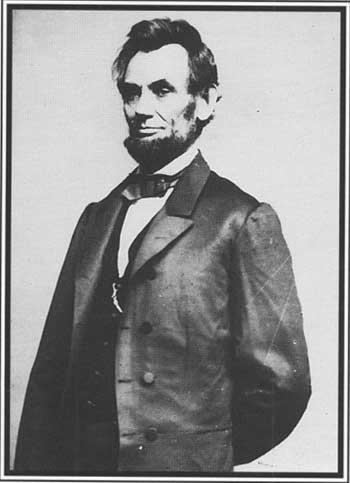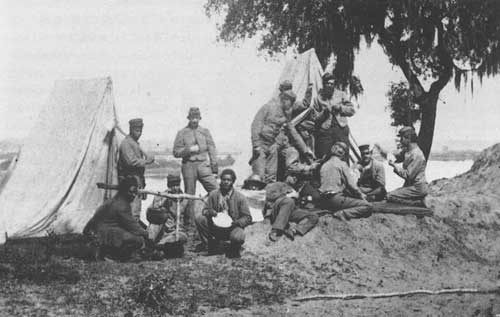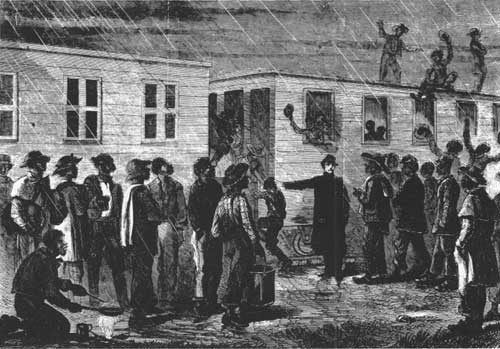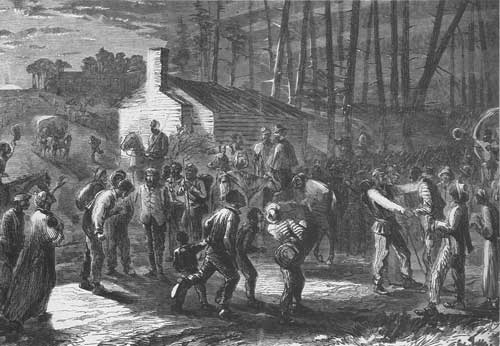|
LINCOLN'S DECISION FOR EMANCIPATION
Initially, most Northerners regarded this as a white man's war and
saw no need to seek aid from the black population. In fact, many whites
feared the war would end before they had an opportunity to prove their
prowess in battle. But as months in military service dragged on into a
year and more, casualties and untold hardships compounded. By the early
summer of 1862, tens of thousands of Northern soldiers had taken their
final resting place, and untold more would live their remaining days
without limbs or in impaired health. Battlefield victories came
sporadically, if at all, and at great cost in human lives.
Discouragement and disillusionment slowed enlistment to a trickle and
spurred desertion and malingering. The war that Federals thought they
might miss had become a war that might never end. Union soldiers,
civilian advocates of reunion, and President Abraham Lincoln had reached
a critical juncture.

|
PRESIDENT ABRAHAM LINCOLN (NA)
|
Slowly yet steadily the cost of war forced them to re-examine their
commitment to restoring the Union. Some decided the price was too high
and withdrew their support or left military service. But most renewed
their faith in the Union cause. The purpose of the war was sound, they
reasoned. The problem was the way the Federal army fought it. Success
demanded a more vigorous prosecution of the war. "There is now no
possible hope of reconciliation with the rebels." Halleck told to Grant
in early 1863. "The Union party in the South is virtually destroyed.
There can be no peace but that which is forced by the sword. We must
conquer the rebels or be conquered by them." Pro-war northerners had to
view the Confederate nation, both soldiers and civilians, as their
enemy, and to consider anything that Confederates used to wage war as a
legitimate target of the Federal army. The Northern populace had to make
greater sacrifices and devote an enlarged share of their resources to
suppress the rebellion. They also had to increase the number of men in
uniform, to make the Confederate populace feel the hard hand of war.

|
SLAVES WORKING AS COOKS IN A CONFEDERATE CAMP. (UC)
|
For some time, Abraham Lincoln had been expanding the scope of the
war. Early on, he had suspended habeas corpus and agreed to the
confiscation of Rebel property, including slaves who labored on
Confederate military projects, as a necessity of war making. Over the
first year of war, Lincoln and the Congress also had urged a dramatic
increase in the size of the armed forces and printed greenbacks to
finance the war. Before the year was out, they endorsed the first
conscription law and instituted an income tax to offset wartime
expenses.

|
A WARTIME NEWSPAPER ILLUSTRATION OF BLACK RECRUITS BEING SENT OFF TO
BATTLE.
|
Within that atmosphere, Lincoln began to mull over the idea of
wartime emancipation and black enlistment. Personally, he disliked the
institution of slavery and had for decades. Yet the president was
hesitant to strike a major blow at the "peculiar institution." Many
Union loyalists, both North and South, owned slaves or supported the
concept of slavery, and others argued that they had no interest in
fighting a war over slavery. An astute politician, the president tried
to balance all interests, attempting to win the war, retain the loyalty
of slaveholding states, promote a Union party in the Confederacy, and
placate the demands of Northern radicals. Once he concluded that
Southern Unionists could not gain ascendancy over the secessionists, and
that the border states were secure he felt freer to implement more
extreme policies to aid the war effort. To newspaperman Horace Greeley,
Lincoln explained his position:
My paramount object in this struggle is to save the Union, and
is not either to save or destroy slavery. If I could save the
Union without freeing any slave I would do it, and if I could
save it by freeing all the slaves I would do it; and if I could
save it by freeing some and leaving others alone I would also do that.
What I do about slavery and the colored race I do because I believe it
helps to save the Union; and what I forbear, I for bear because I do
not believe it would help save the Union.
When the war had reached such magnitude that a true reunion of the
states without the destruction of slavery was impossible, the president
acted.
After wrestling with the issue for some months, Lincoln came to a
momentous conclusion. "Slavery is the root of the rebellion, or at least
its sine qua non [without which, there would be none]," he
explained to a White House delegation. "The ambition of the politicians
may have instigated them to act, but they would have been impotent
without slavery as their instrument." Emancipation would, as Lincoln had
said four years earlier, "place it where the public mind shall rest in
the belief that it is in the course of ultimate extinction."
In July 1862, Lincoln decided on emancipation and black enlistment in
the army. But at the suggestion of Secretary of State William Seward, he
delayed the announcement of emancipation until the Federals won a major
victory. Otherwise, the decree would look like a desperate gamble from a
losing nation. Unfortunately, the next major Union triumph on the
battlefield was in September, at Antietam, Five days later, he unveiled
to the world his plan for emancipation.
Lincoln refused to await a victory, however, to embark on black
military service. Enlistment had slowed, and the Union army needed
recruits as soon as possible. African Americans were the largest
untapped source of manpower. Thus he proceeded with his plan of black
military service cautiously, first endorsing Butler's federalization of
black militia units, then authorizing Higginson's formation of a black
regiment in South Carolina.
By scrawling his signature to the Emancipation Proclamation, Lincoln
was formalizing his position that slavery was at the heart of the
national crisis. Lincoln announced that the war had reached such scope
that a return to a union as it was in 1860 was no longer possible. If
the Northern states won, he was removing the single greatest cause of
sectional conflict, the institution of slavery, from the political
agenda.
Technically, the proclamation freed no one. It simply pledged that as
Federal troops conquered secessionist territory after January 1, 1863,
the slaves in that area became free. He justified the decision on the
basis of his constitutional powers in time of war. As commander in
chief, he could order the seizure of anything that aided the Rebel war
effort. Slaves most certainly did that. And to reinforce this decision,
both as a means of freeing slaves and embarking on a new and bold
approach to the war, Lincoln decided to put those freed men and any
other black males into the Union ranks.
For Lincoln it was a calculated risk. By taking slaves away from
secessionist supporters, he was depriving the Confederacy of valuable
laborers; and if these same slaves joined the Union ranks and performed
important service that helped win or shorten the war, then the policy's
success would silence its critics. As Lincoln explained to Grant, "It
works doubly—weakening the enemy and strengthening us." Lincoln
gambled that the military service of African Americans would vindicate
both his decisions.
To those who opposed emancipation and
black enlistment, Lincoln defended his action forcefully and cleverly.
The president simply argued that he was employing all means at his
disposal to restore the Union.
|
To those who opposed emancipation and black enlistment, Lincoln
defended his action forcefully and cleverly. The president simply argued
that he was employing all means at his disposal to restore the Union. "I
thought that in your struggle for the Union, to whatever extent the
negroes should cease helping the enemy, to that extent it weakened the
enemy in his resistance to you," he suggested. "Do you think
differently? I thought that whatever negroes can be got to do as
soldiers, leaves just so much less for white soldiers to do, in saving
the Union. Does it appear otherwise to you?" Whites, Lincoln shrewdly
contended, did not have to feel as if they were fighting for
emancipation. The ultimate objective of the war was still reunion.
"You say you will not fight to free negroes. Some of them seem
willing to fight for you; but, no matter. Fight you, then, exclusively
to save the Union. I issued the proclamation on purpose to aid you in
saving the Union. Whenever you shall have conquered all resistance to
the Union, if I shall urge you to continue fighting, it will be apt
time, then, for you to declare you will not fight to free negroes."

|
BLACK SOLDIERS LIBERATE SLAVES IN NORTH CAROLINA. (LC)
|
|
|
